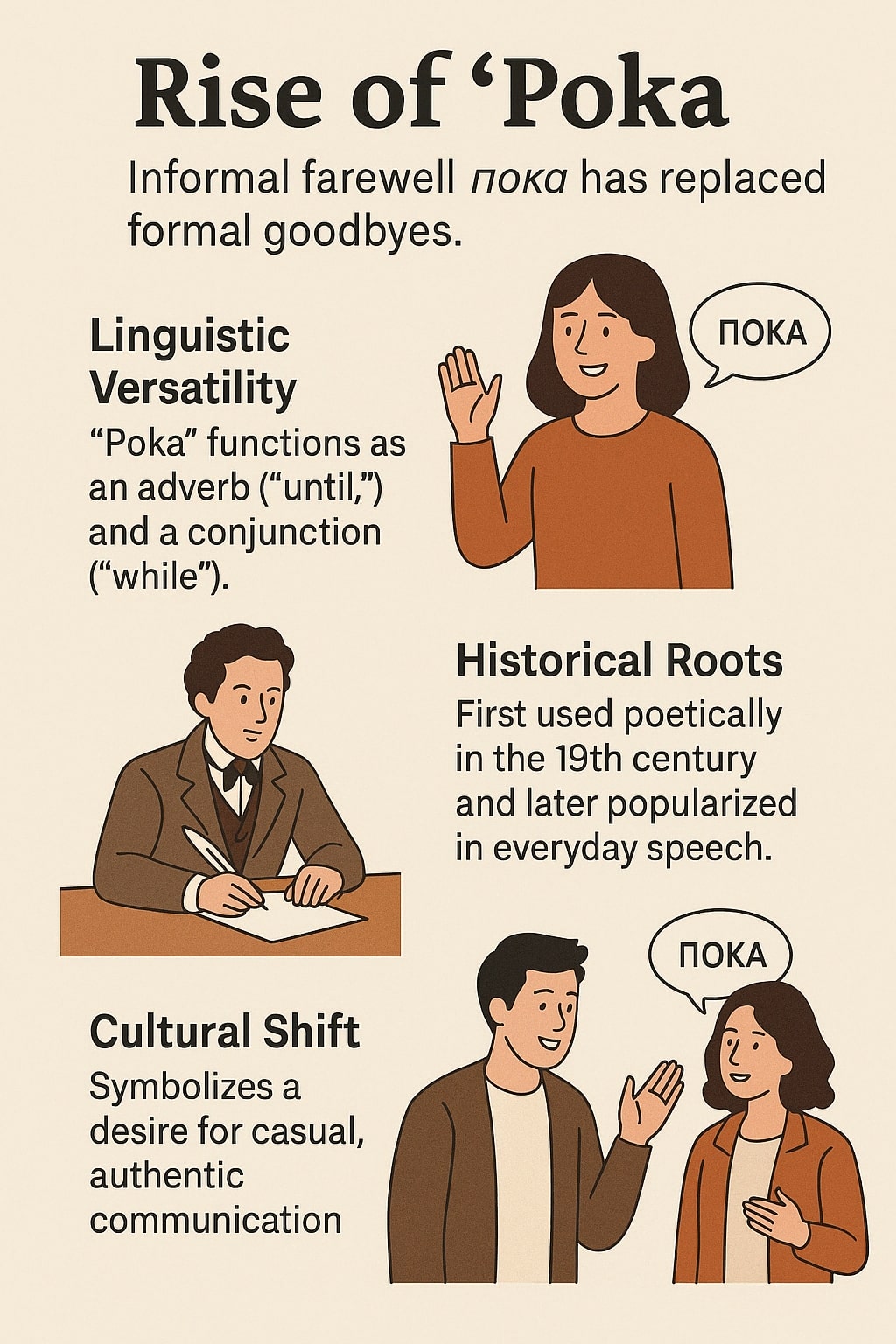In contemporary Russian society, the informal farewell “poka” has supplanted traditional goodbyes. This shift reveals a deep-rooted desire for connection among individuals. The choice of “poka” or “until” over more formal expressions reflects evolving social dynamics and the impact of historical events. As communication styles transform, the implications of this linguistic preference invite further exploration.
The Evolution of Farewell Expressions in Russian

In Russian culture, the expressions used to say goodbye have evolved significantly over time. Traditionally, farewells were more formal and elaborate, with phrases such as “до встречи” (do vstrechi), meaning “until we meet again,” and “до свидания” (do svidaniya), which translates to “goodbye.” These expressions conveyed a sense of formality and anticipation of future meetings.
In contrast, modern Russian speakers often prefer the shorter, more casual term “пока” (poka) to say goodbye, especially among friends and family. This shift mirrors similar trends in other languages, where informal goodbyes like “bye” in English, “ciao” in Italian, and “tschüss” in German have become common. Interestingly, “пока” as a standalone farewell is a relatively recent development; it was not commonly used in this way in the early 20th century.
The word “пока” serves multiple functions in Russian. It can act as an adverb meaning “until,” “yet,” or “so far,” as in the sentence “Он пока не нашел работу” (“He hasn’t found a job yet”). It also functions as a conjunction meaning “while,” for example, “Пока шёл дождь, мы читали” (“While it was raining, we were reading”). Most notably, “пока” is widely used as an informal way to say “bye,” such as in “Он сказал мне ‘пока’ и убежал” (“He said ‘bye’ and ran away”).
The adoption of “пока” as a casual farewell surprised some language experts. Kornei Chukovsky, a renowned Soviet children’s author and linguist, expressed his astonishment at this linguistic change in his book “Alive as Life,” noting how sudden and unusual it seemed compared to traditional farewells.
The evolution of “пока” from a temporal adverb to a friendly goodbye exemplifies how language adapts to social changes and the preferences of its speakers. This small word carries a rich history, reflecting broader cultural shifts in communication styles within Russian society.
Understanding the Functions of “Poka”
The linguistic versatility of the word “poka” reveals a rich meaning within the Russian language. Its functions extend beyond merely serving as an informal farewell; “poka” acts as an adverb, denoting ‘until’ or ‘yet’, and as a conjunction meaning ‘while’.
This duality reflects a fluidity in informal communication, capturing the essence of moments shared and the anticipation of future encounters. Usage examples illustrate its adaptability: “Он пока не нашел работу” illustrates a temporal context, while “Пока шёл дождь, мы читали” showcases its connective role.
Ultimately, “poka” embodies a modern, liberated expression of connection in everyday life.
The Historical Roots of “Poka”

Evolving from a versatile expression in informal communication, “poka” carries a rich historical significance that traces its roots back to the early 20th century. Initially, its early adoption by poets like Pyotr Vyazemsky in 1821 highlighted its poetic origins, meaning ‘for now, goodbye’. The term gained traction in the 1920s, particularly within the creative intelligentsia, as it emerged from abridged phrases like “Посиди пока” (Sit until).
This shift reflected a burgeoning desire for more casual, approachable language, setting the stage for its eventual normalization in everyday Russian discourse. The use of “poka” symbolized a progression toward a more liberated communication style, breaking away from the rigid formalities of the past.
Cultural Shifts Post-Revolution
With the upheaval of the Russian Revolution, a notable transformation in communication emerged, reflecting the changing societal landscape. Revolutionary language began to permeate everyday interactions, fostering a sense of connection among individuals. The rise of informal greetings, particularly the use of “poka,” symbolized a departure from rigid formalities.
As this casual farewell gained popularity, it mirrored a broader democratization of communication, allowing people to express camaraderie freely. The shift from traditional goodbyes to more relaxed expressions, like “until,” encapsulated a yearning for authenticity in relationships. This reinforced the notion that language evolves in tandem with the quest for personal and societal freedom.
Linguistic Significance of “Poka”
As informal farewells like “poka” gain traction in everyday Russian conversation, they illuminate the intricate relationship between language and cultural identity. This shift towards informal language reflects evolving social dynamics, where traditional, formal expressions yield to more relaxed alternatives. The embrace of “poka” signifies a democratization of communication, emphasizing connection over separation.
As Russians adopt this modern farewell, they simultaneously redefine their cultural narrative, showcasing adaptability amid historical change. Such linguistic evolution invites speakers to engage more freely, reinforcing bonds while challenging the rigidity of past norms. In this way, informal farewells become powerful symbols of contemporary Russian identity, highlighting the dynamic nature of language and its role in shaping societal values.





